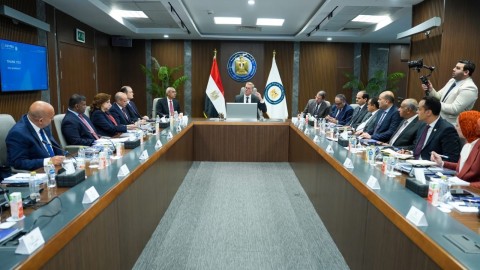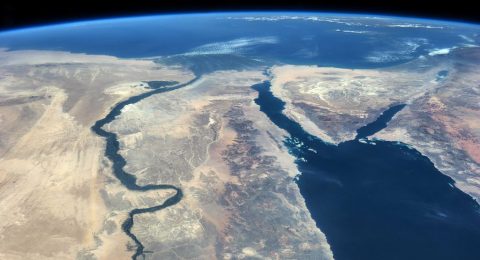Egypt Oil & Gas was honored to host the ‘Digitalization in Oil and Gas’ Webinar on October 10th under the patronage of H.E Tarek El Molla, Minister of Petroleum and Mineral Resources.
The webinar brought together many esteemed guests who tapped the tremendous digital transformation efforts and the ministry of petroleum (MOP)’s progressive digitalization vision. “In 2016, [MOP] dedicated a whole program in [its] Modernization strategy for digitalizing the Oil and Gas sector in order to be more efficient, achieve optimal performance and full monitoring and control over the whole value chain to take well informed decisions,” El Molla stated in his opening speech. The digital transformation of the oil and gas sector had more than 70 initiated projects, according to the speech.
The sector has walked an impressive path in its digital transformation and it is still exerting efforts to bear the fruits of development. “Over the last few years, the spirit of partnership, the vision, the leadership, in terms of making a step change in the sector has been phenomenal,” according to Karim Badawi, Director – Enterprise Digital Performance at Schlumberger.
Digital Transformation: A Success Story
Digitalization had been a distant goal in the past, however, it became quite feasible and necessary. “Digitalization is not just a trend, but an essential part of how the E&P sector must operate,” Sameh Sabry, EOG Committee Chairman, Senior Vice President and Managing Director Egypt at Wintershall Dea, noted.
Today, “companies are seeing digital transformation as an opportunity to develop their own intellectual property, if you like to materialize their own ideas and differentiation in software,” David Holmes, General Manager – Energy at Dell Technologies, pointed out.
The Egyptian oil and gas sector has been operating for a long time, and hence it has a lot of data that could be hectic if unorganized, yet it would be very profitable when it is well-structured.
The need of a well-structured system inspired the sector to use digital tools and establish magnanimous digital platforms like the Egypt Upstream Gateway (EUG). Digitalizing the sector is going to bestow great benefits on the petroleum industry since it was initiated. There are “many potential benefits in digitizing the oil and gas industry,” David Chi, Region Vice President and General Manager Apache, stated, adding that “it can lead to more efficient decision making and operations, which will result in lower cost per barrel and higher return on investment, it can also help to ensure safer operations & better environmental awareness.”
Ashraf Farag, First Undersecretary for Agreements and Exploration, Ministry of Petroleum and Mineral Resources, agreed, saying that the “EUG will have an impactful role on attracting new upstream investments.” Moreover, “having EUG in place, the Egyptian Oil & Gas sector established a role model for upstream business,” Farag pointed out.
Digitalization has become a must to de-risk the oil and gas activities and decrease downtime. “Digital transformation is really a competitive advantage that we need for the petroleum sector, not just to try to change the culture to more digital and empower a remote working environment. That goes without saying, and we have been living this during the COVID era so far very successfully in Egypt. But digital transformation is also there to improve performance, increase productivity, reduce downtime, use real-time data for production improvements and enhancement, to reduce downtime in drilling, and to improve targeting there as well as asset-integrity, predictability for preventive maintenance, to maintain the integrity of our assets and infrastructure and facilities,” Sabry explained.
Commenting on the success of the digital transformation program so far, Hoda Mansour, EMEA South Head of Business Process Intelligence (BPI) at SAP, said that “the vision and the resilience we witnessed in Egypt running the Modernization Program at the Ministry of Petroleum during the year of COVID, I would say that it was second to none.”
“There is a lot to be done in Egypt when it comes to Business Process Intelligence, there will be massive need to improve efficiencies, provide continuous improvement mechanisms and benchmarking to industry best practices; to compare where we are today versus other industry leaders in other companies in affiliated sectors,” Mansour noted.
Taking steps in the Modernization project’s 7th pillar, the digital transformation program, such as establishing the EUG, which was described by El Molla as “a giant step in digitalization of upstream business,” has helped Egypt safely go through a tough year caused by the Corona Virus Pandemic.
The EUG: Connecting Players
The EUG is a prominent asset in the oil and gas digitalization program. It “is a world-class national E&P data repository that preserves legacy data, manages the active data and promotes investment opportunities through international bid rounds to accelerate E&P activities,” according to El Molla.
Prominent oil and gas leaders appreciate the role of the EUG in developing the Egyptian oil and gas sector and preserving its data. “Having accomplished a massive large amount of data herd, petabytes and petabytes of data is no mean feat, and is actually the foundation upon which we build our digital transformation programs,” Hans-Christian Freitag, Vice President, Intelligent Software Solutions at Baker Hughes, said.
The Egyptian gateway will support the upstream business and accelerate exploration, as it will help in driving the value from data through regional geographical and geophysical (G&G) studies supporting the ministry’s digital transformation vision.
The EUG now has full potential and security measures to protect data through its disaster recovery center. Moreover, the gateway development does not stop here as it still has many goals to achieve.
Digitalization for Integration, Support
The digital transformation of the oil and gas sector further aims to bring together the petroleum players under one umbrella. “Program seven has many objectives, one of them is to link EGPC and the holding companies and their affiliated companies under a unified network , which mandates upgrading and integrating the existing operational technology systems with the information technologies across the entire oil, gas and Petrochemical sector operations, while assuring information security and confidentiality throughout the digital transformation process,” Ashraf Bahaa, Chairman and Managing Director at the Egyptian Mintenance Company (EMC), said.
The digital transformation of the oil and gas sector in Egypt is following certain guidelines that are “prepared for this program to ensure the required degree of integration,” according to Bahaa.
Meanwhile, Osama Salem, Business Development General Manager at ENPPI, explained the process of starting the digital transformation program, stating that teams of experts sat together to set the program’s goals. These teams “shared the goals with the IOCs and technology provider as well as companies all over the sector, the upstream; the mid-stream; and the downstream, to guarantee the value chain, and then the next step we tried to get what is exactly installed and we have in our sector, and then verifying the gaps between what we want to reach or the target model that we are dreaming to reach and between the actual status in the sector. Then, from that gap, we will plan for several digital transformation projects that will be running in parallel.”
To ensure the integration across the sector and to support its digital transformation, the digitalization program has several pillars including the enterprise resource planning (ERP). The “ERR team is one of the main pillars of Program 7, the pillar support in ERP system implementation and maximize the benefits of the existing one to be able to achieve MOP vision to reach a real time integration between all holding companies and their affiliate companies and MOP,” according to Dawlat Hashem, Assistant Chairman for Communication and Information Technology at the Egyptian Natural Gas Holding Company (EGAS).
To achieve the goals from the ERP systems, it is crucial to ensure alignment between business strategies and IT. Hashem explained that “successful ERP implementation requires: alignment between business and IT, executive sponsorship and support, trusted external partner (consulting and software vendor), internal qualified team, change management, as well as training and capacity building.”
Innovation for a Digital Sector
The webinar went on giving the voice for digital solutions providers talking about supporting the oil and gas sector’s digitalization.
Many technology vendors have been supporting energy industries across the world in their digitalization efforts. For example, “Huawei serves more than 20 top oil and gas companies, such as Gazprom, ADNOC, Aramco, etc. We have rich experience in the oil and gas industry. What’s more, we are assisting customers in digital transformation during current global pandemic. Take CNPC Daqing as an example,” Robin Lu, Vice President of Huawei Global Energy Group, said.
“The existing reservoir exploration information system in Daqing is outdated and has low computing performance,” Lu explained, adding that “In this project, nearly 700 sets network devices were deployed, and a 400G high-speed cloud data center core network was built, improving the computing efficiency by 833% with 1,000 trillion times per second computing capability.”
Using advanced technologies in the oil and gas sector needs the cooperation of digital solution providers whose technology match with MOP’s digital transformation vision. “Technology can help in many ways, and based on what H.E [El Molla] said, it is actually matching what Cisco is doing in terms of strategy as well,” according to Ayman Elgohary, General Manager & Regional Director Cisco – Egypt, North Africa & Levant (NAL).
Elgohary explained that leadership and knowledge transfer “can help the oil and gas sector advance in this area [sustainability], and also can help other sectors as well.”
Meanwhile, Wintershall Dea introduced the exploration Advisory Tool, which is “a great example of how artificial intelligence can support our people in decision making. The Exploration Advisory Tool is the cognitive search engine for unstructured data that we have developed in cooperation with IBM,” Kathrin Dufour, Senior Vice President Digitalization & Technology at Wintershall Dea, stated.
The webinar also discussed the digital future from the point of view of the technology vendors. “The key to the digital transformation lies in the convergence of ICT technologies and industries. Innovations such as Big Data, IoT, cloud computing, AI, and 5G support the digital transformation. Just like P7 targets of MoP Modernization Project,” Lu noted.
When it comes to the security of data, technology, clouding, and artificial intelligence can help preserve data pack-up and ensure the safety of digital process. The oil and gas sector “needs to have a cyber-security strategy in place or otherwise, you won’t be able to operate the whole thing,” Elgohary explained.
Digital-oriented Capabilities
The culture shared among the oil and gas sector talents is a major goal when it comes to digital transformation. “One of our main objectives is nourishing a digitally oriented culture and the sustainability of the digital transformation process of the sector companies,” El Molla stated, adding that “digital transformation isn’t just transforming processes into the digital world; it’s about having a culture that adapts to such kind of change.”
Holmes agreed, saying that “digital transformation is a cultural transformation. It has to go throughout organizations, and it is something that every team member has to be part of whether in terms of contributing to or embracing the transformation.”
Having a digital-oriented culture is not only a goal of digitalization, but it is also necessary to achieve the objective of digital transformation. “It is very important to stress and highlight on human capital objective, it is necessary to build a knowledge transfer culture,” Bahaa noted. “This culture can be achieved by establishing dedicated in-company digital Transformation teams that will lead the change management process and carry on all the efforts on digital transformation in their companies in the oil and gas sector,” he added.
The digital transformation of the oil and gas sector “can enable capacity building for the workforce of the future, promote a more innovative mindset and culture, and in creating a more attractive investment environment,” Chi explained.
Digital transformation and recent technology are crucial for the petroleum industry. It is not only about technology, but it is about people, culture, and mindset, in digitalizing the oil and gas sector. Covering many highlights and insights of the oil and gas sector digital transformation, the webinar closed with hopes to meet again in such an informative webinar.








